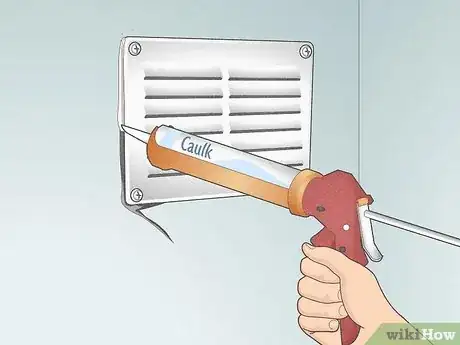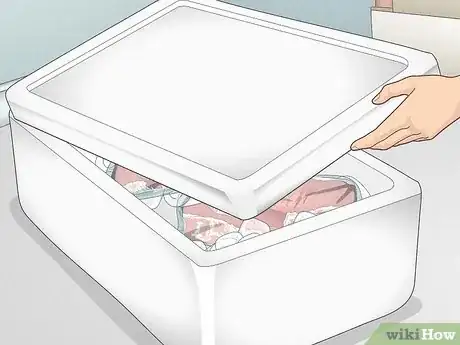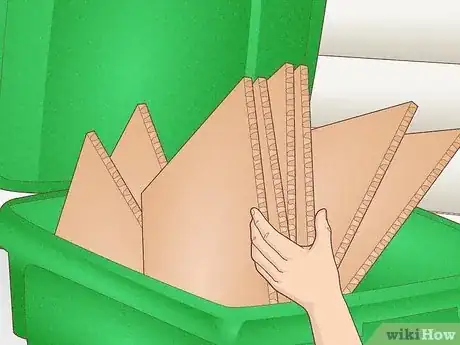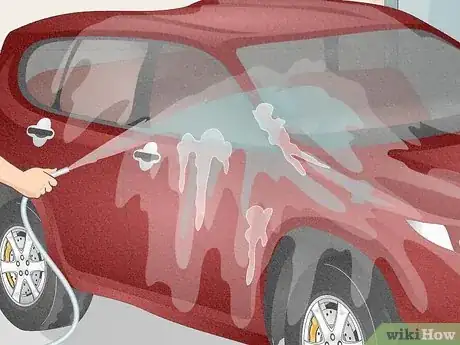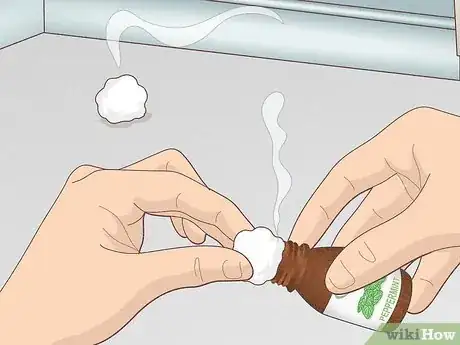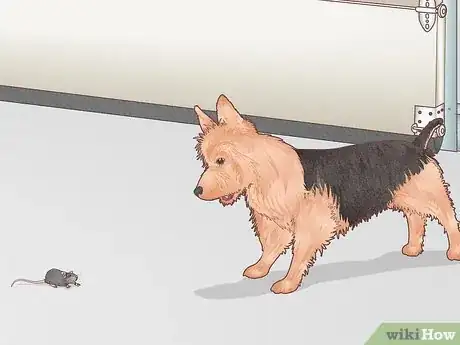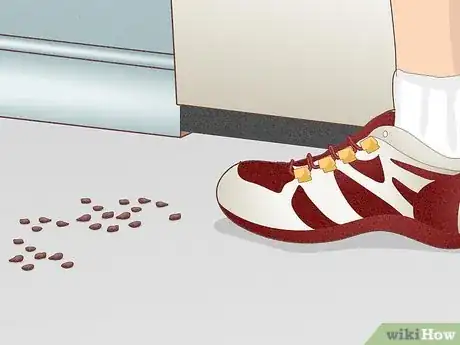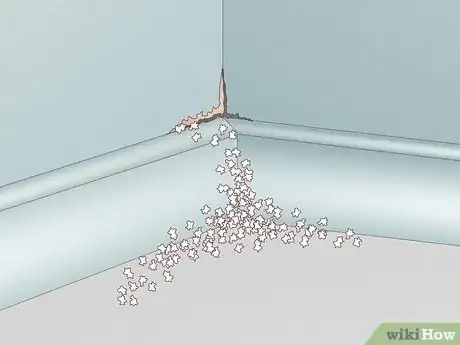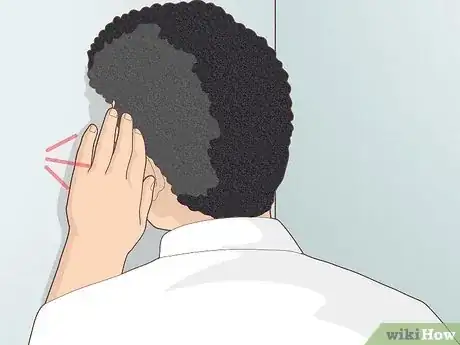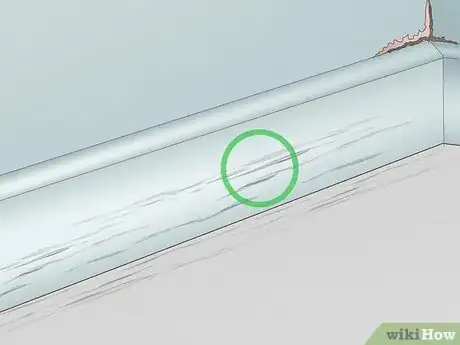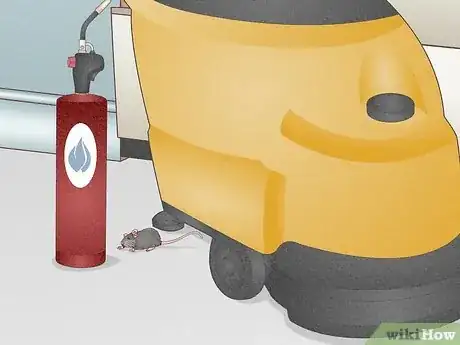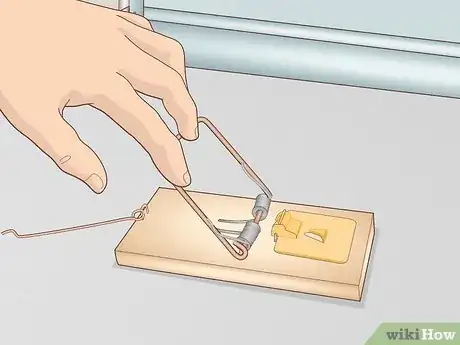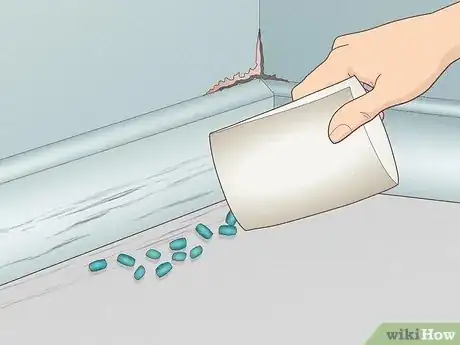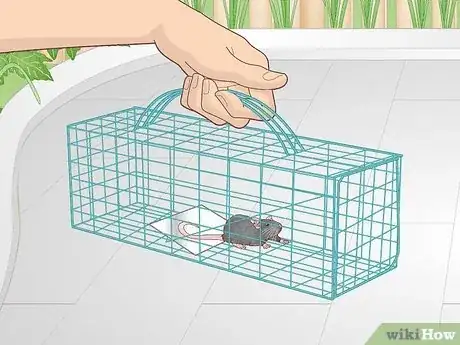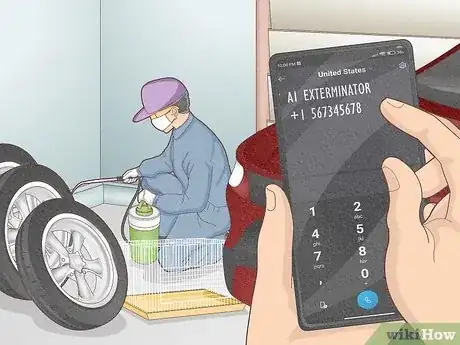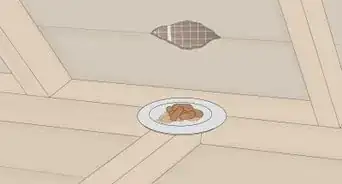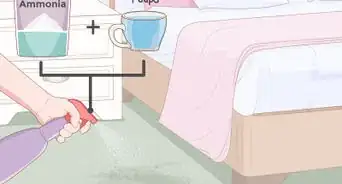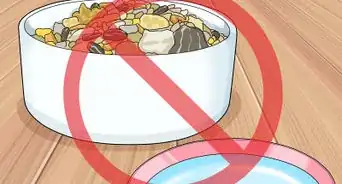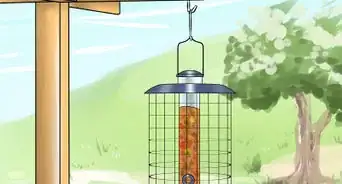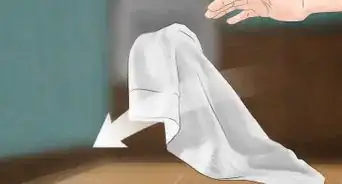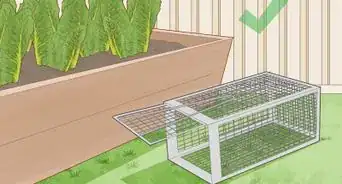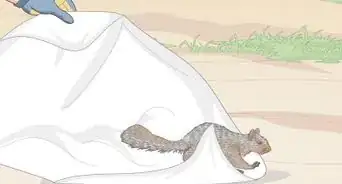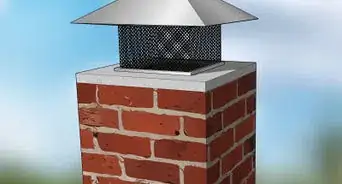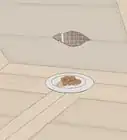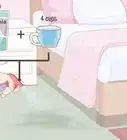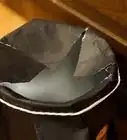This article was co-authored by Chikezie Onyianta and by wikiHow staff writer, Luke Smith, MFA. Chikezie Onyianta is a Pest Control Specialist and the Owner of EcoFusion Pest Control, serving communities in New Jersey, Pennsylvania, and New York. With over 5 years of experience, he specializes in pest control in both residential and commercial spaces. A graduate of Essex County College, Chikezie and EcoFusion assist in rodent, roach, and ant pest control as well as bed bug services.
There are 10 references cited in this article, which can be found at the bottom of the page.
This article has been viewed 2,021 times.
Mice are sneaky and persistent pests, and are particularly good at finding their way into places like your garage. Not only can they cause property damage, but they can also bite and even carry diseases. The last thing you need is a rodent infestation, and we’ve got the best tips and solutions to help you dodge a serious pest problem. Read on to learn how to ward off rodents, how to spot them, and what to do if you have them.
Things You Should Know
- The best way to prevent mice is to remove food and bedding materials from the garage.
- Seal any possible entrances to keep mice away.
- Use lethal or live traps to remove any mice already in your garage.
- Call an exterminator or pest expert if the issue gets out of hand.
Steps
Preventing a Mice Infestation
-
1Seal any gaps bigger than 1⁄4 inch (0.64 cm). Mice will find just about any way to get in, so it’s your job to find those small entrances first. Check areas in your garage near pipes, cables, and vents, and stuff steel wool into cracks to block off rodents.[1] Also check appliance hookups and water, electric, and pipe terminals in your walls, where contractors may have left such gaps.
- Don’t use materials like rubber, plastic screening, vinyl, wood, or insulating foam to seal gaps, since these can be gnawed through by mice.[2]
- This process of sealing your home against rodents is called “exclusion” and is the most reliable way to prevent pests. If a mouse can’t get inside, it also can’t cause much trouble.
-
2Keep food sealed away. Mice are attracted to the smells of food, and will try to enter most any space where they can smell it. Keep edible items in secure containers and keep trash cans tightly sealed. Also keep pet food sealed and stored on a high shelf.[3]Advertisement
-
3Eliminate possible nesting materials. Mice love things that they can use to make nests, and if the material is present, they’ll most likely nest nearby. Remove things like cardboard, paper, or plant matter from your garage.[6]
- Firewood is another common bedding material for mice, as well as a source of food with all the small insects that like to hunker down within the logs. Instead of storing it in the garage, keep firewood at least 30 feet (9.1 m) from your home.[7]
-
4Clean up your car, or park it on the street. Your car can be an appealing source of food and shelter for mice, especially if you keep your car in the garage, and moreso if your car has things like food wrappers or bedding material sitting inside it. Keep your car tidy and free of attractors, or consider parking it on the street or otherwise away from your home.[8]
-
5Use essential oils as repellents. Though not as proven as other methods, some claim that essential oils like peppermint or clove can be used to keep mice away. Soak a cloth or a cotton ball in the oil and position them in places that could see mice, like corners and crevices.[9] Eucalyptus oil may also be an effective repellant.[10]
-
6Consider keeping a cat or a dog. Pets that are also predators are a time-tested pest management strategy. Not only can they hunt rodents, but their presence alone can be a rodent deterrent.[11] Just be sure you’re up to the task of caring for a new pet!
Spotting Signs of Mice
-
1Rodent droppings Mice and other rodents are notorious for the frequency of their droppings, and so they can’t help but leave this obvious sign. If you find small, dark pellets near where you store food or on shelves or in drawers and other cabinets, you almost definitely have an infestation.[12]
-
2Chewed holes or bedding material Classic signs that a mouse has taken up residence in your home include small holes chewed into the floor or walls. Mice will use these for easy access in and out of your living space. Also keep an eye out for bedding materials like shredded paper, plant matter, or fabric on the floor or in the nooks and crannies of your garage. These are clear indicators that a rodent has come to stay.[13]
-
3Strange noises Mice are prone to a variety of small and irksome noises, which can include their signature squeaking or clawing and chewing within the walls of your home. Listen closely near walls and attic spaces, where mice particularly prefer to nest.[14]
-
4Tracks or rub marks Rats and mice sometimes leave trails to guide them to food or to their nests. These can appear as dark trails along the floor or molding of your home, and are caused by dirt and oils in rodents’ fur.[15]
-
5Mouse sightings It’s the most obvious sign, and also the most reliable. If you spot a rodent in your home, then it’s probably already a regular visitor. Mice tend to explore widely and scavenge from multiple sources in a day. One mouse scurrying across your floor could mean your home is just one stop of many, and that there’s more than one rodent around.
Getting Rid of Mice
-
1Use spring traps. While many people may not want to use lethal traps, these traps prove highly effective, and are safer for you and your family in many ways. Carefully bait the trap with peanut butter or fat on the trap’s pan, and position the trap perpendicular to the wall of your garage.[16] You can also bait a trap with bedding material like cotton balls. Dispose of any trapped mice using rubber gloves, and spray disinfectant on any areas touched by the mouse.[17]
- Try to place traps in areas where you have seen mouse activity, and especially in areas with mouse droppings. Good places include behind appliances and inside the drawers of a workbench.
- Snap traps kill quickly and are considered the most humane of the lethal traps.[18]
-
2Use poison bait. Poison baits work by delivering a lethal dose of toxin to the suspected mouse. The most effective poison baits contain anticoagulants, and these are also the least toxic and pose the least danger to humans. Place poison baits near the walls of your garage and in any location with suspected mouse activity. Keep the bait fresh for at least 15 days, or until the problem has gone away.[19]
- Remove any dead mice using rubber gloves and disinfectant, and dispose of the mouse in a sealed garbage container.
- Notify everyone in your household that you’re using poison bait, and clearly indicate the areas in which you’re using it. This helps keep everyone safe and away from any toxic substances.
-
3Use live traps. Live traps secure the mouse inside, and are one option for anyone looking for a way to remove a mouse without killing it. Bait your traps with peanut butter and place them in dark corners of your garage and behind appliances.[20] When it comes time to release a mouse from a trap, do so far away from your home.
- Be sure to read up on your area’s laws regarding the release of wild animals, as it may not be permitted in certain locations.[21]
-
4Call an exterminator. If your own strategies aren’t working and there are still signs of mice in your garage or home, it may be time to consult a professional. Many exterminators offer humane approaches, and are equipped to handle a more persistent infestation.[22]
References
- ↑ http://ipm.ucanr.edu/PMG/PESTNOTES/pn7483.html
- ↑ http://ipm.ucanr.edu/PMG/PESTNOTES/pn7483.html
- ↑ https://bestlifeonline.com/news-mice-garage/
- ↑ https://www.epa.gov/rodenticides/identify-and-prevent-rodent-infestations
- ↑ https://www.epa.gov/rodenticides/identify-and-prevent-rodent-infestations
- ↑ https://www.epa.gov/rodenticides/identify-and-prevent-rodent-infestations
- ↑ https://bestlifeonline.com/news-mice-garage/
- ↑ https://bestlifeonline.com/news-mice-garage/
- ↑ https://www.goodhousekeeping.com/home/cleaning/a35872/how-to-get-rid-of-mice/
- ↑ https://www.ncbi.nlm.nih.gov/pmc/articles/PMC3913499/
- ↑ https://www.goodhousekeeping.com/home/cleaning/a35872/how-to-get-rid-of-mice/
- ↑ https://www.epa.gov/rodenticides/identify-and-prevent-rodent-infestations
- ↑ https://www.epa.gov/rodenticides/identify-and-prevent-rodent-infestations
- ↑ https://www.pestworld.org/news-hub/press-releases/what-s-that-noise-six-tell-tale-signs-of-a-rodent-infestation/
- ↑ https://www.pestworld.org/news-hub/press-releases/what-s-that-noise-six-tell-tale-signs-of-a-rodent-infestation/
- ↑ https://www.cdc.gov/rodents/prevent_infestations/trap_up.html
- ↑ https://www.health.ny.gov/publications/3206/
- ↑ https://kb.rspca.org.au/knowledge-base/what-is-the-most-humane-way-to-kill-pest-rats-and-mice/
- ↑ https://www.health.ny.gov/publications/3206/
- ↑ http://ipm.ucanr.edu/PMG/PESTNOTES/pn7483.html
- ↑ https://www.ufaw.org.uk/downloads/welfare-downloads/guidance-on-humane-control-of-rodents-feb2509v19.pdf
- ↑ https://www.goodhousekeeping.com/home/cleaning/a35872/how-to-get-rid-of-mice/
